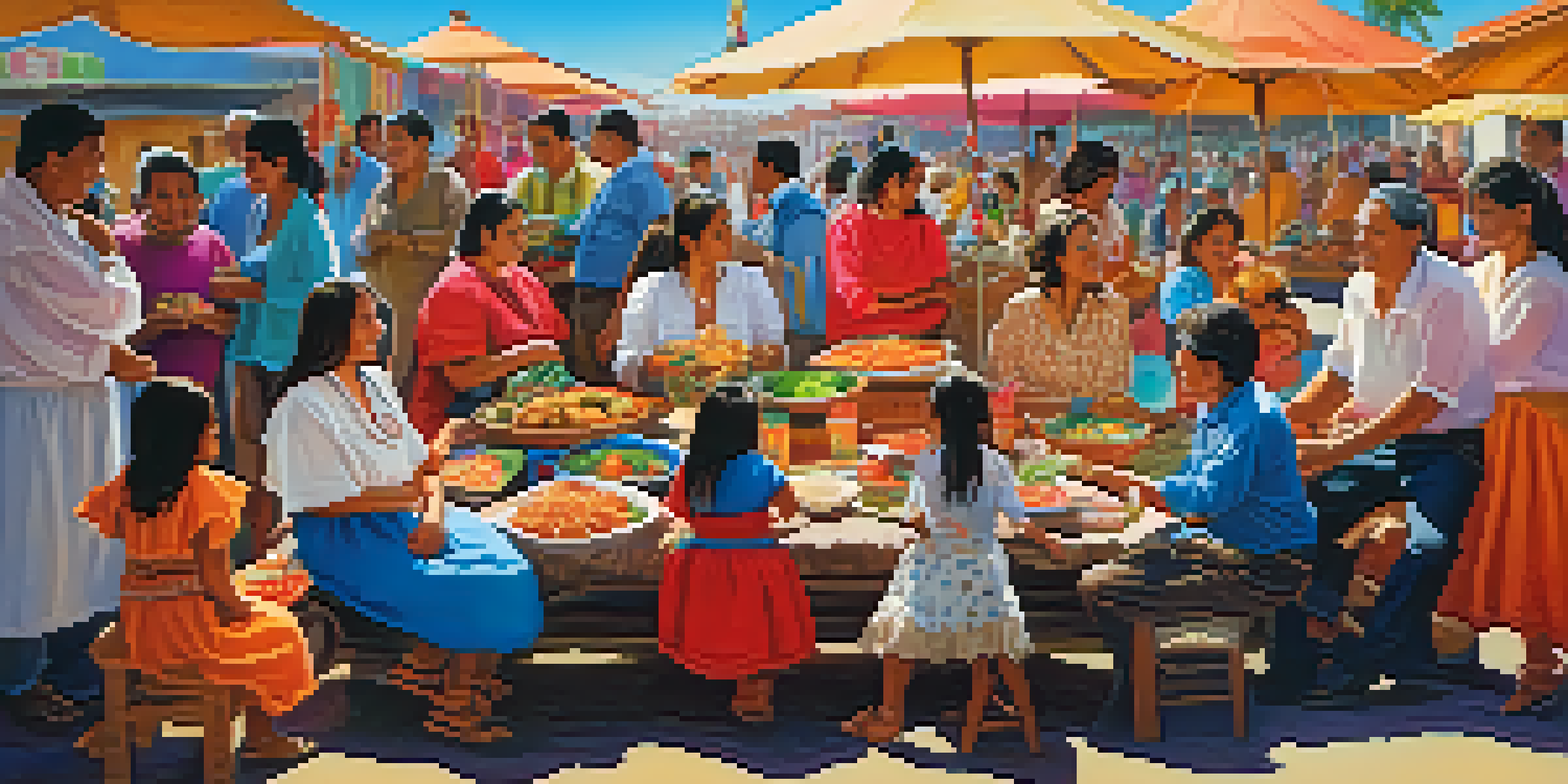Understanding Family Structures and Their Influence in Peru

The Importance of Family in Peruvian Culture
In Peru, family is often regarded as the cornerstone of society, shaping individual identity and communal life. This deep-rooted belief emphasizes the importance of familial bonds, which often extend beyond the nuclear family to include extended relatives. Such connections provide emotional support, social networks, and even economic assistance, making family a vital component of daily life.
Family is not an important thing, it's everything.
The notion of family in Peru can be quite fluid, encompassing grandparents, aunts, uncles, and even close family friends. This extended structure allows for a rich tapestry of relationships where responsibilities and care are shared among many members. Children are taught to value these connections from a young age, fostering a sense of belonging and identity that is critical in Peruvian society.
Traditional family gatherings, often centered around shared meals, celebrate these relationships, reinforcing bonds and cultural heritage. Events like birthdays, holidays, and religious ceremonies become opportunities for families to come together, showcasing the vibrant traditions and values that define their collective identity.
Diverse Family Structures in Peru
While traditional nuclear families are common, Peru is home to a variety of family structures, including single-parent households and blended families. Urbanization and changing social norms have led to a rise in diverse living arrangements, where individuals may choose to prioritize work or personal aspirations over traditional family roles. This evolution reflects broader global trends, but it also highlights Peru's unique cultural context.

In rural areas, extended families often live together, sharing resources and responsibilities. This model not only provides economic support but also strengthens familial ties, as daily interactions foster closeness. Conversely, in urban settings, many families adopt a more nuclear approach, influenced by modern lifestyles and economic pressures.
Family as Peru's Societal Cornerstone
In Peruvian culture, family is essential for emotional support and identity, extending beyond the nuclear family to include a broad network of relatives.
The acceptance of diverse family structures can lead to both challenges and opportunities. For instance, single-parent families may face social stigma, while blended families can enrich cultural experiences, blending traditions and values from different backgrounds. Understanding these dynamics is essential in appreciating the complexity of family life in contemporary Peru.
Impact of Economic Factors on Family Structures
Economic stability significantly influences family structures in Peru, with poverty and employment opportunities shaping how families are formed and maintained. In areas where jobs are scarce, families may rely on multiple generations living together to pool resources and provide support. This practical approach to family life underscores the resilience of Peruvian families in the face of economic challenges.
The family is one of nature's masterpieces.
Conversely, urbanization often leads to economic opportunities that can alter family dynamics. As young adults migrate to cities for work, they may establish independent households, creating a shift from traditional family structures. This transition can cause tension between generations, as older family members may hold onto traditional values while younger members embrace new lifestyles.
The economic landscape also affects gender roles within families, with women increasingly stepping into breadwinner roles. This shift not only changes family dynamics but also challenges traditional perceptions of masculinity and femininity, paving the way for a more equitable division of responsibilities in the home.
Cultural Influences on Family Life
Peruvian culture, rich in traditions and customs, plays a pivotal role in shaping family life. Festivals, religious practices, and cultural rituals often involve the entire family, reinforcing bonds and instilling shared values. Such cultural events serve as a reminder of the importance of family unity and collective identity, making them integral to the Peruvian way of life.
For instance, traditional celebrations like Inti Raymi or Día de los Muertos are opportunities for families to come together, share stories, and pass down traditions. These gatherings not only strengthen familial ties but also educate younger generations about their heritage, ensuring that cultural practices are preserved.
Diverse Family Structures Emerge
Peru's family dynamics are evolving, showcasing a mix of traditional nuclear families, single-parent households, and blended families influenced by urbanization and changing social norms.
Moreover, the influence of indigenous cultures adds layers to the understanding of family dynamics. Many indigenous communities maintain unique familial structures and roles that differ from mainstream Peruvian society, showcasing the diversity within the country. Recognizing these differences enriches the overall narrative of family life in Peru.
The Role of Education in Family Dynamics
Education is a powerful tool that can significantly influence family dynamics in Peru. As access to education improves, families are increasingly valuing academic achievement as a pathway to a better future. This shift often leads to a re-evaluation of traditional roles, with more emphasis placed on the education of children, particularly girls, who have historically faced barriers.
Parents' educational aspirations for their children can foster a sense of ambition and drive within the family, leading to collective efforts to support academic success. This includes financial investments in schooling and encouraging a culture of learning at home. As a result, families may prioritize education over other traditional roles or obligations.
However, disparities in educational access can create challenges within families. In rural areas, where resources may be limited, families often need to make difficult choices about which children can attend school. These decisions can strain relationships and highlight the importance of equitable education policies in fostering healthy family dynamics across Peru.
Family Values and Parenting Styles
Family values in Peru are deeply intertwined with cultural beliefs and practices, influencing parenting styles across generations. Many Peruvian parents emphasize respect, loyalty, and hard work, instilling these values in their children from an early age. This strong emphasis on values shapes how children interact with their peers and elders, fostering a sense of community and responsibility.
Parenting styles can vary widely, often influenced by socioeconomic status, education, and cultural background. In more traditional families, authoritative parenting may be common, where respect for elders and adherence to rules are prioritized. However, as societal norms evolve, some families are adopting more democratic approaches, encouraging open communication and collaboration among family members.
Economic Factors Shape Family Life
Economic stability and challenges significantly impact family structures and dynamics in Peru, affecting roles, responsibilities, and relationships among family members.
This evolving landscape of parenting styles reflects broader societal changes and the influence of global trends. For instance, access to information through the internet allows parents to explore diverse parenting philosophies, leading to a blending of traditional and modern practices. Such shifts highlight the dynamic nature of family values and their impact on future generations.
Challenges Facing Modern Peruvian Families
Despite the rich cultural fabric of Peru, modern families face various challenges that can strain relationships and disrupt family structures. Issues such as economic hardship, migration, and social changes can lead to increased stress and conflict within families. Understanding these challenges is crucial for developing effective support systems that can help families thrive.
One significant challenge is the impact of migration, both internal and international. Many families are separated when members move to urban areas or abroad in search of better opportunities. This separation can create emotional distance and strain familial bonds, necessitating efforts to maintain connections through technology or visits.

Additionally, societal pressures related to gender roles and expectations can create tension within families. As women increasingly enter the workforce, balancing professional and familial responsibilities can become a source of stress. Addressing these challenges through community support, education, and policy changes is vital for fostering resilient family structures in Peru.